- Partner Marketing Alternatives at a Glance
- Features Glossary
- What Is Impact?
- What to Look For in an Impact Alternative
- Best Impact Alternatives for Partner Marketing
- 1. Everflow – Best All-in-One Performance Marketing Platform
- 2. PartnerStack – Best for Scaling SaaS & B2B Partnerships
- 3. Refersion – Best for E-commerce and Influencer Programs
- 4. Post Affiliate Pro – Best for Complex Commission Structures
- 5. Partnerize – Best for Global Retail & Enterprise Brands
- 6. Tapfiliate – Best for Growing Ecommerce & SaaS Hybrids
- 7. FirstPromoter – Best for Early-Stage SaaS Startups
- Final Summary
Last Updated on December 30, 2025 by Ewen Finser
Partner marketing is one of the quickest and most effective marketing techniques for scaling revenue, but as I’ve discovered in my own business, the partner marketing platform you choose is crucial. Choose one that doesn’t fit with your business and objectives, and you could find yourself wasting a lot of time and marketing budget for limited results.
If you’ve researched partner platforms, chances are you’ve come across Impact. It’s a powerful platform with lots of features which are perfect for global brands. But in my experience, the complexity and cost mean it’s not suitable for a lot of businesses. Let’s look at some of the top alternatives on the market and how to decide which is the right partner marketing platform for your business.
Partner Marketing Alternatives at a Glance
In a hurry? I’ve included my top alternatives in the table below with the key features and pricing so you can choose the right one for you.
Perfect for | Key Features | Pricing | |
Everflow | Scaling SaaS and ecommerce businesses, agencies, and enterprises | Advanced analytics, multi-touch attribution, fraud detection, multi-channel tracking (affiliates, influencers, ads), partner marketplace (Skimlinks), CRM integrations | Custom pricing (mid to top end) |
PartnerStack | Scaling B2B and SaaS companies | Multichannel tracking (affiliates, referrals, and resellers); automated payouts; built-in partner marketplace | Custom pricing (top end) |
Refersion | E-commerce and influencer-focused DTC brands | Shopify integration, affiliate and influencer marketplace, built-in tracking and reporting | From $39/mo + 3% of affiliate sales |
Post Affiliate Pro | Businesses with complex commission structures | Flexible commissions (tiered, lifetime, recurring), coupon tracking, direct link tracking, fraud detection, detailed reporting | From $139/mo |
Partnerize | Large enterprises and global retail brands | Enterprise automation, partner discovery tools, multi-market tracking, campaign management, advanced analytics | Custom pricing (top end) |
Tapfiliate | Scaling ecommerce and SaaS hybrids | Recurring commissions, white-label dashboards, multilingual support, Shopify/Stripe/WooCommerce integrations | From $$89/mo |
FirstPromoter | Early-stage SaaS startups | Recurring payouts, seamless Stripe integration, customizable referral campaigns | From $49/mo |
If you’re managing multiple channels or scaling fast, Everflow is my top choice as it gives you enterprise-level functionality without Impact’s complexity. PartnerStack is ideal for SaaS, while Refersion and Tapfiliate are good choices for ecommerce, and FirstPromoter is a great starting point for small SaaS teams. Post Affiliate Pro and Partnerize are included in the list as they have impressive features and customization options, but they’re best suited for advanced users.

Features Glossary
If you’re new to partner marketing, then some of the jargon above might be a little confusing. Below is my guide to the key features that I look for in partner marketing software and why.
Multi-Touch Attribution
Multi-touch attribution tracks every touchpoint along the customer journey, not just the last partner before a sale. That means you get a clearer overview of which partners are really driving sales and are most valuable to your business.
Fraud Detection
As your partnerships increase, the risk of fraud also increases. Fraud detection tools monitor traffic and conversions to spot bot clicks and fake leads. This helps protect your marketing budget and make sure it’s only going to legitimate partners.
Partner Marketplace
Partner marketplaces are really valuable as they allow you to easily discover new partners, affiliates, and influencers. This can save you from spending lots of time manually finding and reaching out to partners, so you can scale quickly.
Recurring Commissions
Recurring commissions mean you can reward affiliates for repeated upsells or monthly subscription renewals. This helps you to build relationships with affiliates who send you the most high-value customers.
White-Label Dashboards
If branding is important to your business, then white label dashboards can be really useful. They allow you to brand your partner portal with your logo, colours, and font to create a professional and on-brand experience for all your partners.
API Integrations
If you use lots of different softwares then API integrations are important. They allow you to connect your partner platform to your existing tools or ad networks, which can make setup easier and make sure information is shared seamlessly across your business.
Tiered Commissions
Tiered commissions allow you to incentivise high-performing affiliates by giving higher payouts once certain sales targets are hit.
Cross-Channel Tracking
If you’ve got a multi-channel marketing strategy, then you need cross-channel tracking. It means you can monitor your affiliates, PPC, influencers, and media buyers all in one place, so you have a holistic view of your marketing ROI.
What Is Impact?
Impact is one of the most established partnership automation platforms. It’s used by a lot of global brands due to its enterprise-level features. It can easily handle complex multi-channel programs and comes with multi-channel attribution, in-depth metrics, and significant automation options.
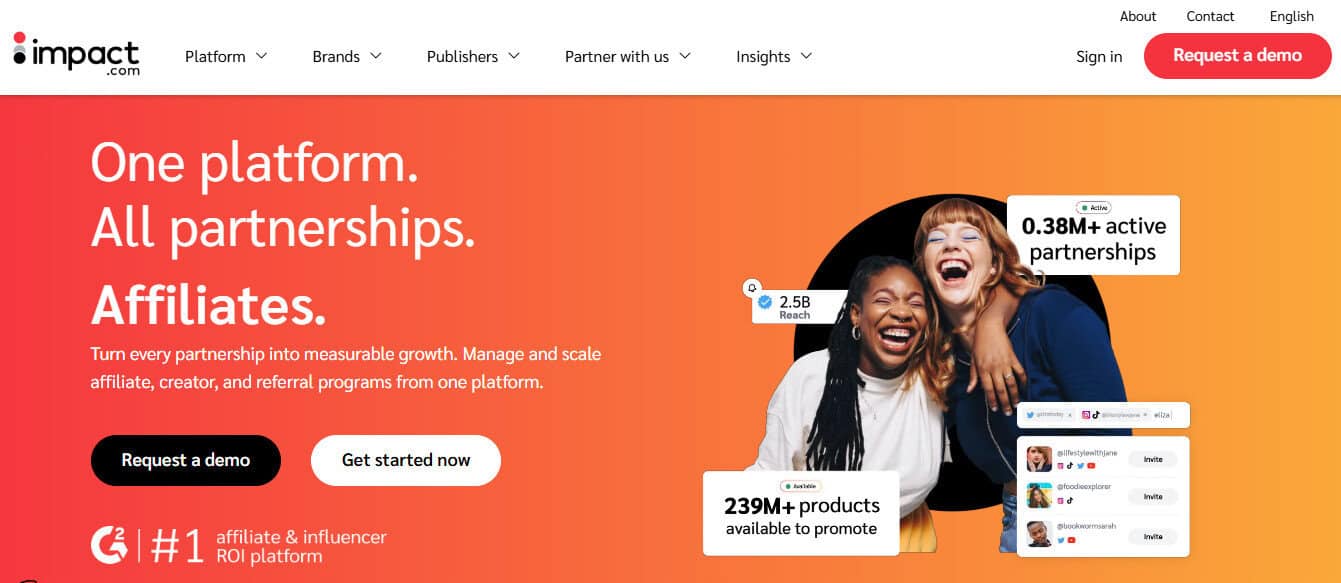
But while it’s a really impressive program, it’s not right for everyone. I dabbled with it when I first started using partner marketing in my ecommerce business and quickly realised that it was far too complex and powerful for what I needed. The learning curve was too much for me, which is one of the reasons I abandoned it, and the pricing was really stretching my budget.
I shopped around and found that other options on the market, like Everflow, could fulfil my needs at a lower cost and with a much easier setup. That’s why I suggest considering the other options in this article, which are easier to get started with and will scale with your business.
What to Look For in an Impact Alternative
Before we dive into the alternatives, I think it’s important to get clear on what to look for in a partner marketing platform. I’ve discussed some of the key features, but how do you know which ones to prioritise? These are the key factors I consider:
What Are Your Growth Ambitions
You need to consider your growth ambitions so that you choose a program that can grow with you. How many partners would you like to have in 6 months time, and how many channels will you plan to use in 12 months time? I’m guilty of not thinking this through in the past, and it’s meant that I’ve had to switch platforms after only a few months, which has cost me time and money.
How Much Time and Expertise Do You Have?
How much technical expertise do you have, and how much time have you got to dedicate to implementing a new program? If you’re time poor then a program like Impact, which requires a lot of training and technical knowledge, is going to be a challenge.
What Features Do You Need?
Get clear on what you need in your business, now and in the next few months:
- Do you need fraud protection? If you’re scaling your partner marketing program, then this is a must.
- What are your tracking requirements, e.g., do you need multi-touch attribution and cross-device tracking?
- Do you need a partner marketplace? If you’re planning on growing a large partner program, then a built-in marketplace could save you a lot of time.
What Integrations Do You Require?
Your partner platform needs to easily integrate with your other softwares, like your CRM, billing system, or ad tools. If your e-commerce store runs on Shopify, choosing a platform that doesn’t integrate nicely with Shopify is going to be a problem.
What’s Your Budget?
Work out what budget you can allocate to your partner marketing platform – there are cheaper options on the market like Refersion, but they’re going to be more limited than enterprise options. Programs like Everflow offer custom pricing, which can be a great option as the pricing grows with your business.
Best Impact Alternatives for Partner Marketing
If you’ve struggled with the pricing or complexity of Impact, the good news is there are plenty of other options on the market. I’ve listed the top 7 alternatives I would consider below. All of them come with an impressive range of features, with options for businesses of different sizes and budgets.
1. Everflow – Best All-in-One Performance Marketing Platform
I’ve included Everflow at the top of the list as it’s the partner marketing platform I use for my e-commerce business. It’s not the cheapest in this list, but it delivers fantastic value. It’s been built for performance marketers who need to manage multiple channels, including affiliates, influencers, paid ads, and agencies, and you can keep track of all this from one easy-to-read dashboard. It did take me a bit of time to get my head round all the features, but it comes with training and video tutorials to guide you through the process.
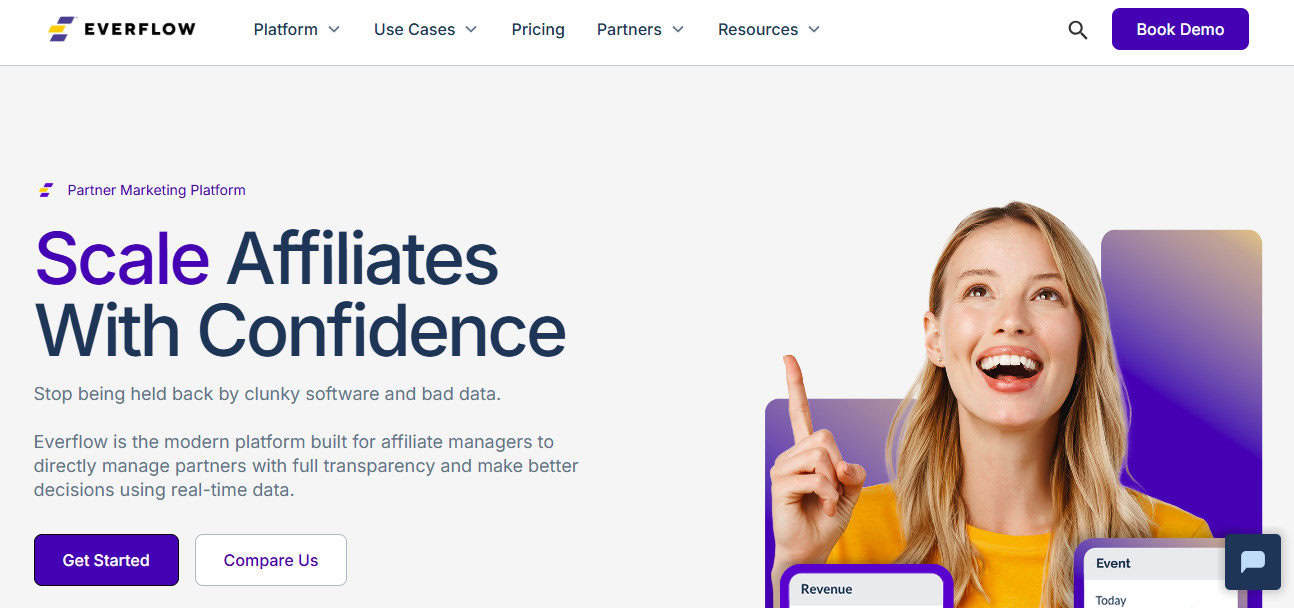
What It’s Great For
- Advanced analytics and attribution tracking
- Built-in fraud detection and cross-channel reporting
- Partner marketplace via Skimlinks integration
- Supports affiliates, influencers, media buyers, and agencies
- Customisable dashboards and strong API/CRM integrations
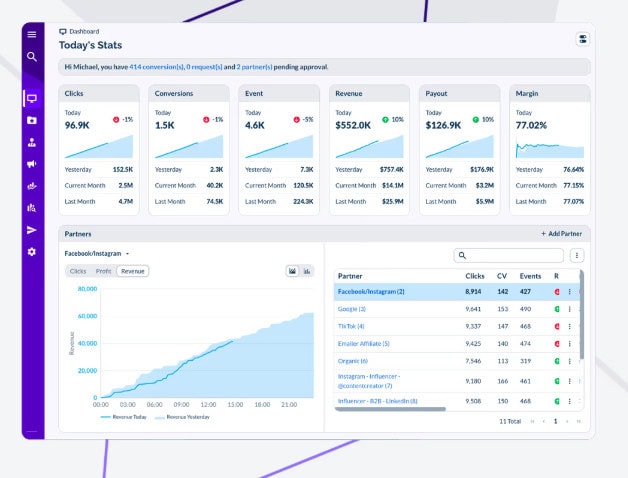
Drawbacks
- Slightly steeper learning curve at the start (although the onboarding process helps with this)
- It’s not the cheapest of the alternatives, but it delivers the best value
Pricing
There is custom pricing based on your requirements. It’s at the mid-to-high range but much more flexible than Impact.
2. PartnerStack – Best for Scaling SaaS & B2B Partnerships
PartnerStack is another comprehensive multi-channel partner marketing platform, covering affiliates, referrals, and resellers within one program. It has a large B2B partner marketplace, which makes it a good fit for scaling B2B businesses. It also supports recurring commissions, making it well-suited for recurring revenue models used by SaaS companies – these features make it a more expensive option, though.
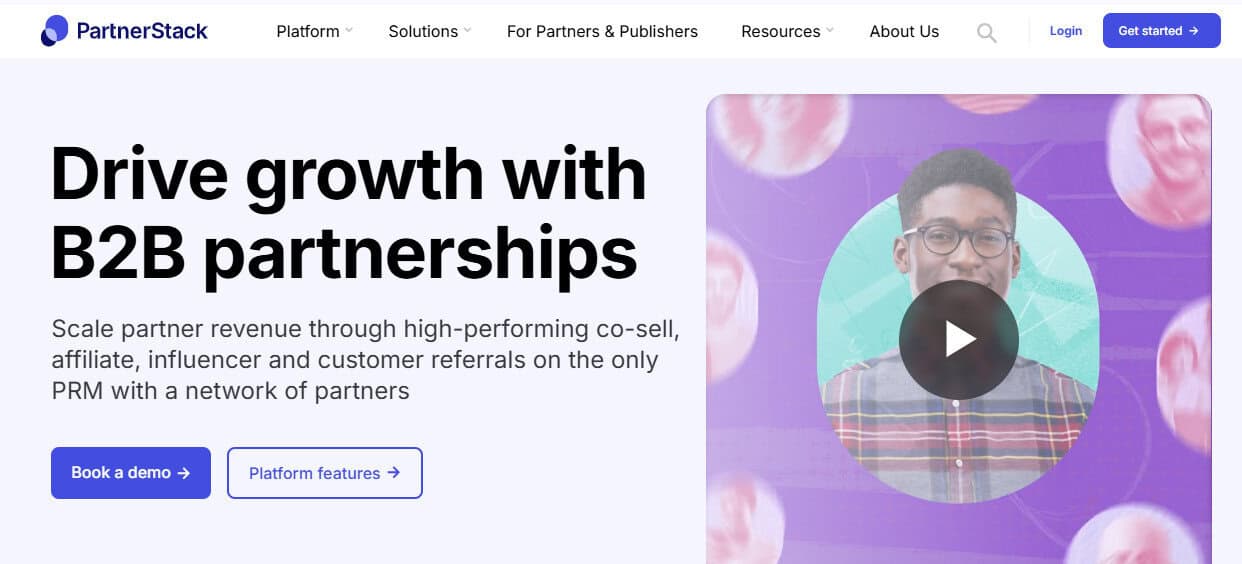
What It’s Great For
- Perfect for SaaS and B2B recurring-revenue models
- Combines affiliate, referral, and reseller programs
- Partner marketplace with thousands of active partners
- Automated payouts and reporting
- Excellent for MRR-based commission structures
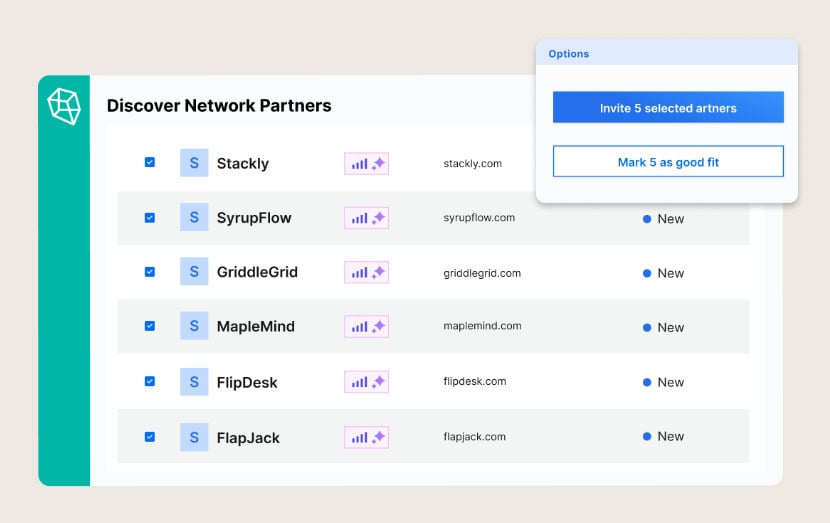
Drawbacks
- Setup and onboarding can take time
Pricing
Custom pricing based on volume and feature requirements. It’s at the more expensive end so likely to be for mid to large SaaS companies.
3. Refersion – Best for E-commerce and Influencer Programs
I’ve included Refersion as it’s a good option for e-commerce and DTC brands, due to its integrations. It integrates seamlessly with Shopify, BigCommerce, and WooCommerce, and it’s one of the easiest platforms to get up and running. The built-in marketplace and influencer management tools make recruiting and tracking partners quick and straightforward. I have used Refersion in the past and liked the easy setup, but I ended up moving to the more powerful Everflow program later on.
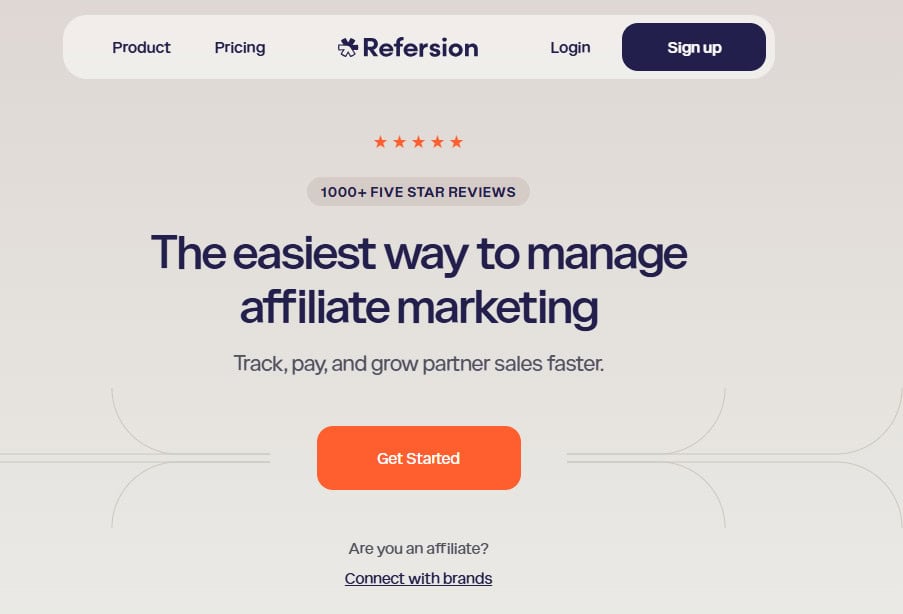
What It’s Great For
- Affordable for start-ups
- Simple setup with top ecommerce integrations
- Built-in affiliate and influencer marketplace
- Easy-to-use dashboards and reporting
- Reliable Shopify support and tracking accuracy
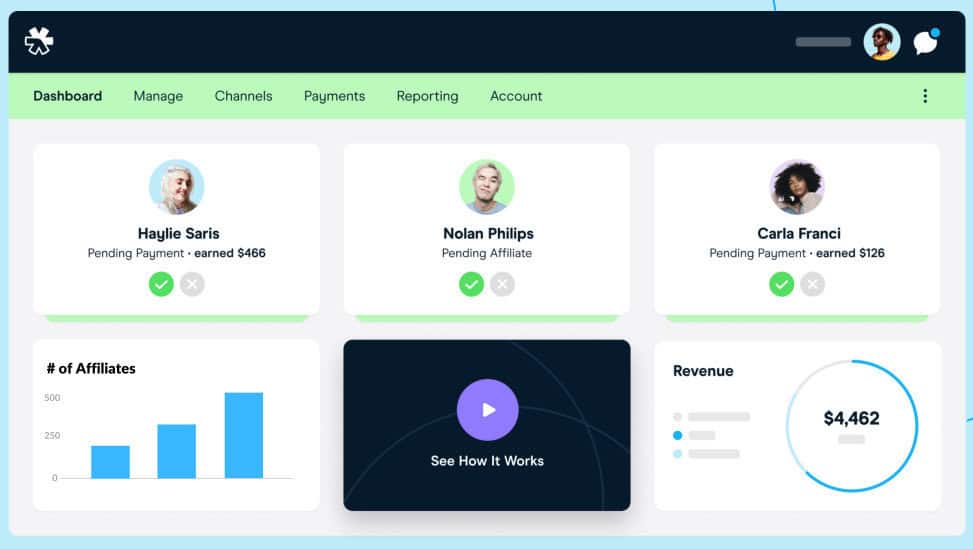
Drawbacks
- Limited advanced analytics compared to Everflow or PartnerStack
- Focused mainly on e-commerce (it’s not ideal for SaaS or B2B)
Pricing
From $39/month + 3% of affiliate-driven sales.
4. Post Affiliate Pro – Best for Complex Commission Structures
Post Affiliate Pro is one of the most established tools in the space, and it’s known for supporting a huge range of commission types, including tiered, recurring, and lifetime options, as well as advanced tracking methods like coupon and direct link tracking. It’s not as slick as newer tools, but its flexibility will suit businesses which need a lot of customization
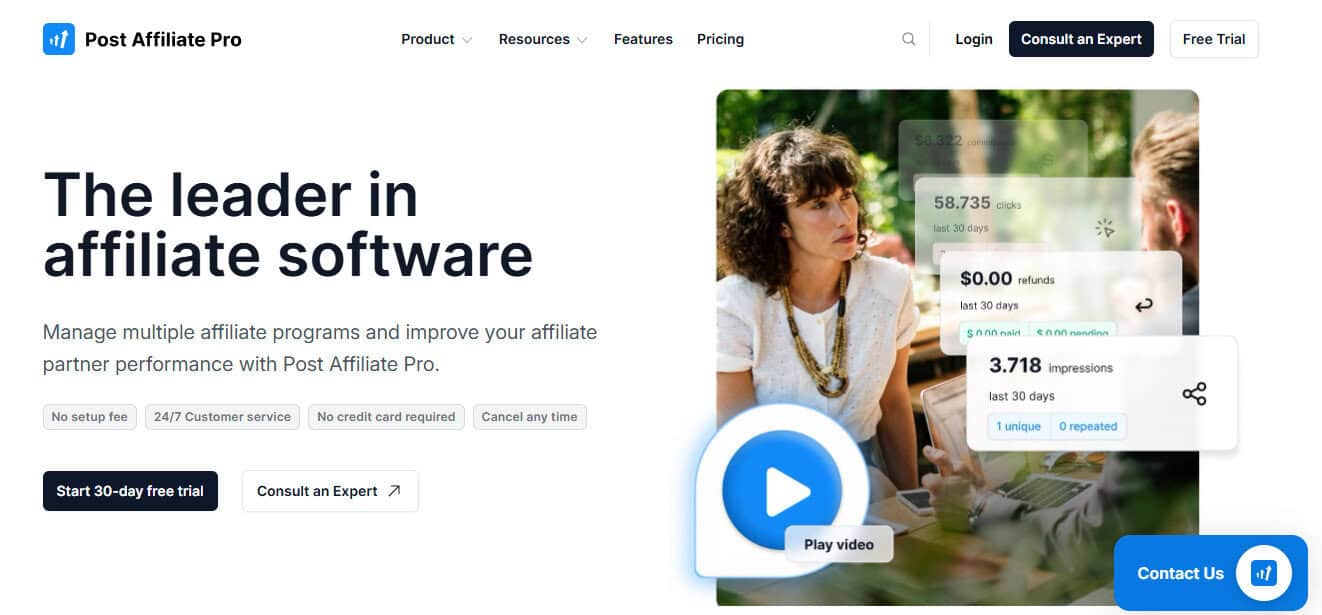
What It’s Great For
- Flexible and highly customisable commission types
- Advanced tracking (sub-affiliates, coupons, and direct links)
- Detailed reporting and fraud detection
- Strong reputation and reliability
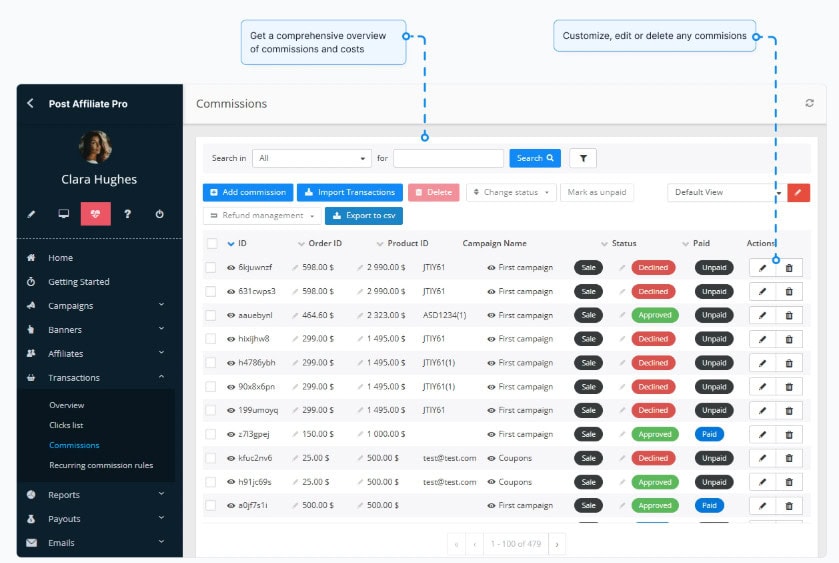
Drawbacks
- The interface feels a little dated
- It’s more complex to set up than some of the more modern SaaS tools
Pricing
Starts at $139/month with a 14-day free trial
5. Partnerize – Best for Global Retail & Enterprise Brands
Partnerize is one of the most sophisticated alternatives on the market, and I would only recommend it for enterprise-level businesses with multinational partner programs. It’s built for global retailers, travel companies, and brands running large-scale partnership programs, and it supports everything from discovery and recruitment to campaign automation and reporting across multiple markets.
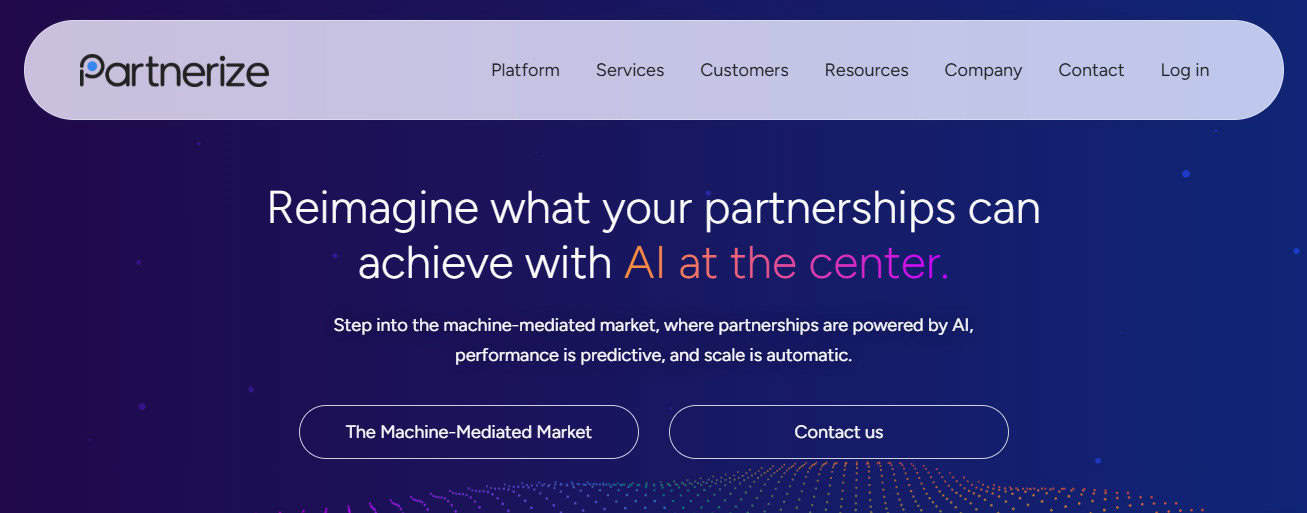
What It’s Great For
- Enterprise-grade automation and scalability
- Excellent for multi-region programs
- Strong partner discovery and recruitment tools
- Advanced tracking and data reporting
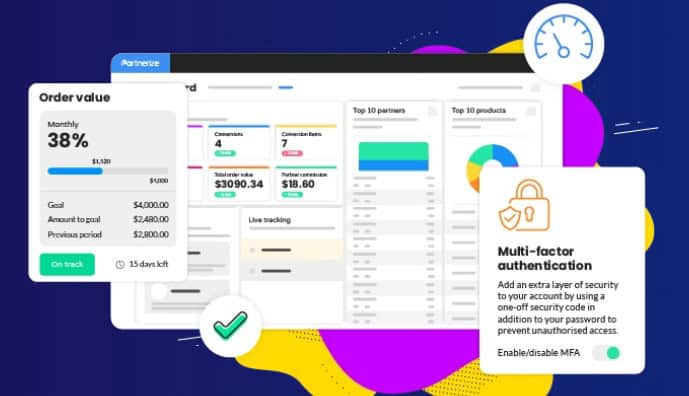
Drawbacks
- Pricing and setup are enterprise-level, which is going to be overkill for smaller businesses or startups
Pricing
Custom pricing, but it’s at the top end and one of the most expensive options available.
6. Tapfiliate – Best for Growing Ecommerce & SaaS Hybrids
Tapfiliate is worth considering for those companies which have outgrown beginner tools but aren’t quite ready for an enterprise platform like Partnerize. It covers all the essentials for a growing e-commerce and SaaS hybrid, such as recurring commission options, white label dashboards, and multi-language support for international markets. Businesses that are looking for a comprehensive performance marketing platform are likely to find Tapfiliate a bit limited, though.
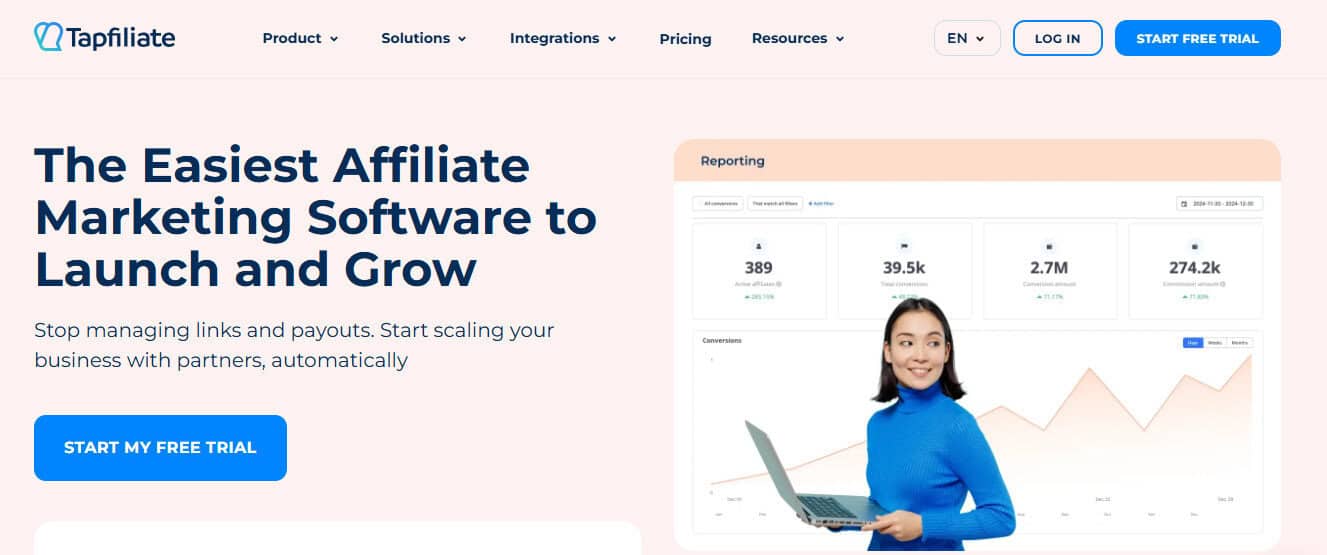
What It’s Great For
- It’s affordable and easy to set up
- Recurring and lifetime commission options
- White-label dashboards and multilingual support
- Works with Shopify, WooCommerce, Stripe, and Wix
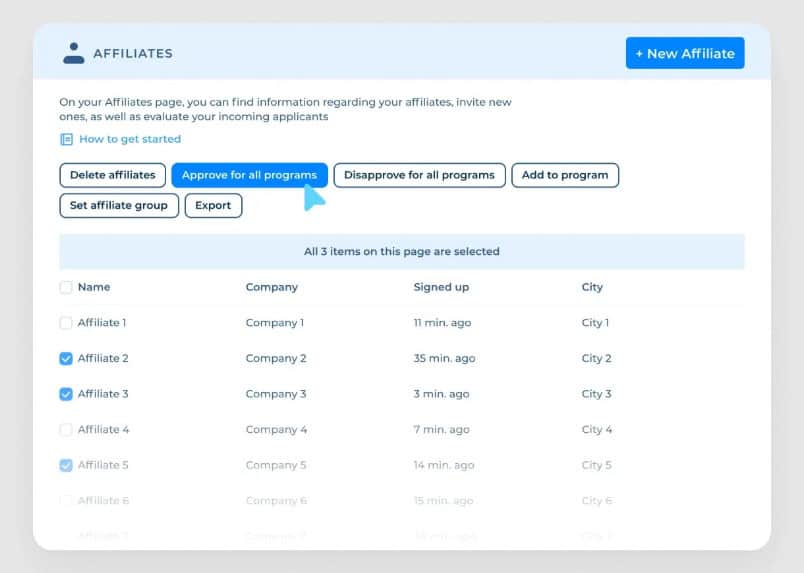
Drawbacks
- Limited reporting depth compared to higher-end tools
- No built-in marketplace for affiliate recruitment
Pricing
Starts at $89/month with a 14-day free trial
7. FirstPromoter – Best for Early-Stage SaaS Startups
FirstPromoter makes the list because it’s a reliable, affiliate, and referrable tracking platform which is specifically designed for SaaS startups using Stripe. It’s light, affordable, and ideal for small teams launching their first affiliate or referral program; however, scaling businesses will likely find it too restrictive.
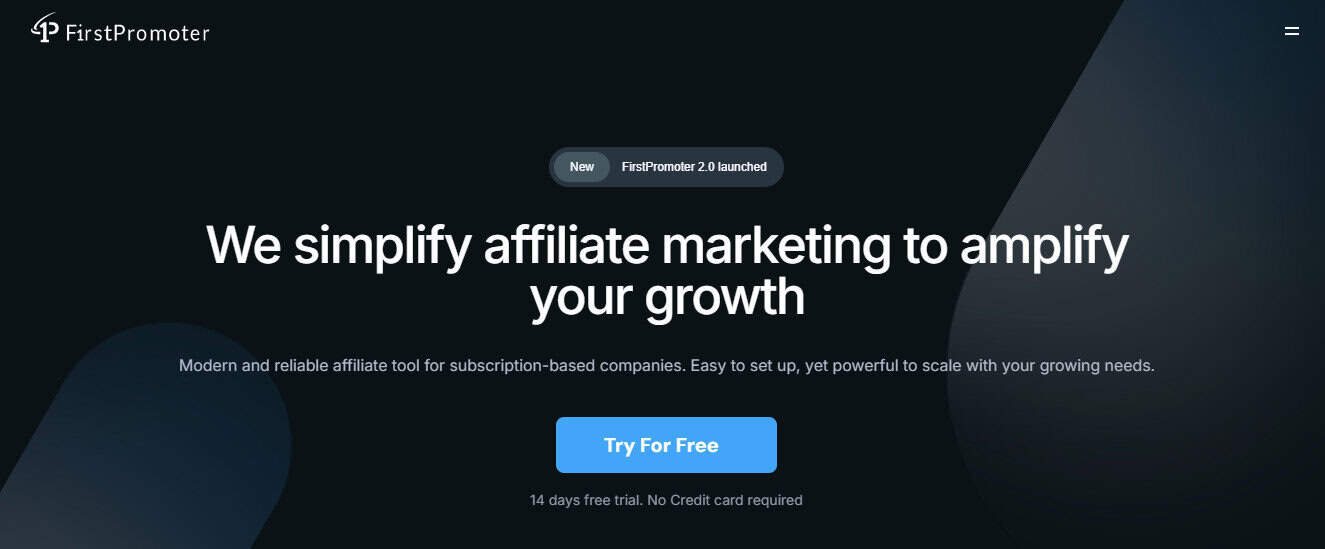
What It’s Great For
- Seamless integration with Stripe and PayPal
- Cost-effective option for businesses with limited marketing budgets
- Recurring commission support
- Easy setup and automated payouts
- Designed for SaaS subscription models
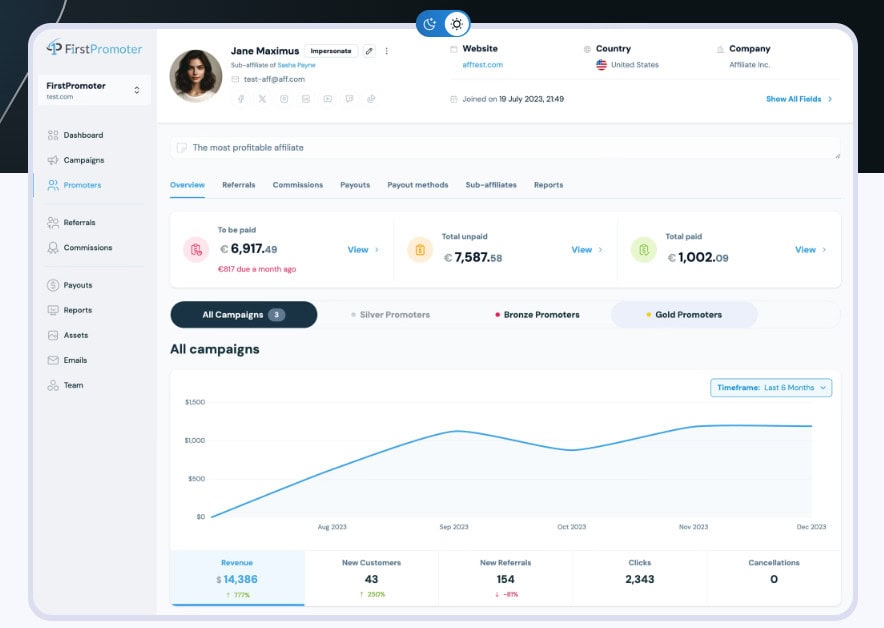
Drawbacks
- Limited customization and integrations
- Not ideal for multi-channel or enterprise programs
Pricing
Starts at $49/month and comes with a 14-day free trial.
Final Summary
I’ve spent a lot of time and money on marketing software over the years, and I’ve learnt that it’s not about which software has the shiniest bells and whistles, it’s about which one best fits with your business and your ambitions. For example, if you have complex commission structures, then you should look at Post Affiliate Pro, while FirstPromoter is a good bet for start-up SaaS businesses. If, like me, you need an all-purpose tool which supports you across multiple channels, offers a range of features, and can grow with you, then I would suggest Everflow. Thanks to its great onboarding program and custom pricing, it offers enterprise-level power without the cost and steep learning curve which you get with some of the enterprise platforms in this list.

